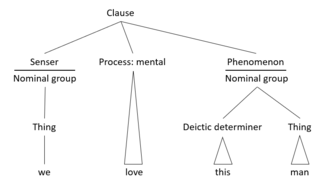Related Research Articles

Emotions are mental states brought on by neurophysiological changes, variously associated with thoughts, feelings, behavioral responses, and a degree of pleasure or displeasure. There is currently no scientific consensus on a definition. Emotions are often intertwined with mood, temperament, personality, disposition, or creativity.

Functional linguistics is an approach to the study of language characterized by taking systematically into account the speaker's and the hearer's side, and the communicative needs of the speaker and of the given language community. Linguistic functionalism spawned in the 1920s to 1930s from Ferdinand de Saussure's systematic structuralist approach to language (1916).

Systemic functional grammar (SFG) is a form of grammatical description originated by Michael Halliday. It is part of a social semiotic approach to language called systemic functional linguistics. In these two terms, systemic refers to the view of language as "a network of systems, or interrelated sets of options for making meaning"; functional refers to Halliday's view that language is as it is because of what it has evolved to do. Thus, what he refers to as the multidimensional architecture of language "reflects the multidimensional nature of human experience and interpersonal relations."
Corpus linguistics is the study of a language as that language is expressed in its text corpus, its body of "real world" text. Corpus linguistics proposes that a reliable analysis of a language is more feasible with corpora collected in the field—the natural context ("realia") of that language—with minimal experimental interference.
Cognitive linguistics is an interdisciplinary branch of linguistics, combining knowledge and research from cognitive science, cognitive psychology, neuropsychology and linguistics. Models and theoretical accounts of cognitive linguistics are considered as psychologically real, and research in cognitive linguistics aims to help understand cognition in general and is seen as a road into the human mind.
Critical discourse analysis (CDA) is an interdisciplinary approach to the study of discourse that views language as a form of social practice. CDA combines critique of discourse and explanation of how it figures within and contributes to the existing social reality, as a basis for action to change that existing reality in particular respects. Scholars working in the tradition of CDA generally argue that (non-linguistic) social practice and linguistic practice constitute one another and focus on investigating how societal power relations are established and reinforced through language use. In this sense, it differs from discourse analysis in that it highlights issues of power asymmetries, manipulation, exploitation, and structural inequities in domains such as education, media, and politics.
Semantic prosody, also discourse prosody, describes the way in which certain seemingly neutral words can be perceived with positive or negative associations through frequent occurrences with particular collocations. Coined in analogy to linguistic prosody, popularised by Bill Louw.
Glossematics is a structuralist linguistic theory proposed by Louis Hjelmslev and Hans Jørgen Uldall although the two ultimately went separate ways each with their own approach. Hjelmslev’s theory, most notably, is an early mathematical methodology for the analysis of language which was subsequently incorporated into the analytical foundation of current models of functional—structural grammar such as Danish Functional Grammar, Functional Discourse Grammar and Systemic Functional Linguistics. Hjelmslev’s theory likewise remains fundamental for modern semiotics.
Corpus-assisted discourse studies is related historically and methodologically to the discipline of corpus linguistics. The principal endeavor of corpus-assisted discourse studies is the investigation, and comparison of features of particular discourse types, integrating into the analysis the techniques and tools developed within corpus linguistics. These include the compilation of specialised corpora and analyses of word and word-cluster frequency lists, comparative keyword lists and, above all, concordances.
Linguistics is the scientific study of human language. It is called a scientific study because it entails a comprehensive, systematic, objective, and precise analysis of all aspects of language — cognitive, social, environmental, biological as well as structural.

Michael Hoey was a British linguist and Baines Professor of English Language. He lectured in applied linguistics in over 40 countries.
Lexicogrammar is a term directly related to systemic functional linguistics. Systemic functional linguistics is a specific approach to adding as much detail as possible when describing lexicogrammar. It was coined by Michael Halliday, the father of systemic functional linguistics, to describe the continuity between grammar and lexis. For many linguists, these phenomena are discrete. But Halliday brings them together with this term. As with other dimensions of Halliday's theory, he describes the relation of grammar to lexis as one of a 'cline', and therefore, one of 'delicacy'. In 1961, he wrote 'The grammarian's dream is...to turn the whole of linguistic form into grammar, hoping to show that lexis can be defined as "most delicate grammar". In 1987, Ruqaiya Hasan wrote an article titled 'The grammarian's dream: lexis as delicate grammar', in which she laid out a methodology for mapping lexis in Halliday's terms.

James Robert Martin is a Canadian linguist. He is Professor of Linguistics at The University of Sydney. He is the leading figure in the 'Sydney School' of systemic functional linguistics. Martin is well known for his work on discourse analysis, genre, appraisal, multimodality and educational linguistics.
Media linguistics is the linguistic study of language use in the media. The fundamental aspect of media linguistics as a new systematic approach to the study of media language is that media text is one of the most common forms of language existence today. It studies the functioning of language in the media sphere, or modern mass communication presented by print, audiovisual, digital, and networked media. Media linguistics investigates the relationship between language use, which is regarded as an interface between social and cognitive communication practice, and public discourse conveyed through media.
In linguistics, stance is the way in which speakers position themselves in relation to the ongoing interaction, in terms of evaluation, intentionality, epistemology or social relations. When a speaker describes an object in a way that expresses their attitude or relation to the object, the speaker is taking a stance. Stancetaking is viewed as a social action that shares the speaker's view of an object with their audience, sometimes inviting listeners to take their own stance as well.
Emotion recognition is the process of identifying human emotion. People vary widely in their accuracy at recognizing the emotions of others. Use of technology to help people with emotion recognition is a relatively nascent research area. Generally, the technology works best if it uses multiple modalities in context. To date, the most work has been conducted on automating the recognition of facial expressions from video, spoken expressions from audio, written expressions from text, and physiology as measured by wearables.
John W Du Bois is a professor of linguistics at University of California, Santa Barbara.

Monika Bednarek is a German-born Australian linguist. She is Professor in linguistics at the University of Sydney and Director of the Sydney Corpus Lab. She is one of the co-developers of Discursive News Values Analysis (DNVA), which is a framework for analyzing how events are constructed as newsworthy through language and images. Her work ranges across various linguistic sub-disciplines, including corpus linguistics, media linguistics, sociolinguistics, discourse analysis, stylistics, and applied linguistics.
Michele Zappavigna is an Australian linguist. She is an associate professor at the University of New South Wales, Sydney. Her major contributions are based on the discourse of social media and ambient affiliation. Her work is interdisciplinary and covers studies in systemic functional linguistics (SFL), corpus linguistics, multimodality, social media, online discourse and social semiotics. Zappavigna is the author of six books and numerous journal articles covering these disciplines.
Suzanne Eggins is an Australian linguist who is an Honorary Fellow at Australian National University (ANU), associated with the ANU Institute for Communication in Health Care. Eggins is the author of a best selling introduction to systemic functional linguistics and she is known for her extensive work on critical linguistic analysis of spontaneous interactions in informal and institutional healthcare settings.
References
- 1 2 3 4 Martin, J.R.; White, P.R.R. (2005). The Language of Evaluation: Appraisal in English. Palgrave. ISBN 140390409X.
- ↑ Bednarek, Monika (2006). Evaluation in media discourse: Analysis of a newspaper corpus. London: Continuum. ISBN 978-0-8264-9126-8. OCLC 76941675.
- ↑ Hunston, Susan (2011). Corpus approaches to evaluation: Phraseology and evaluative language. New York. ISBN 978-0-415-83651-7. OCLC 823552375.
- ↑ DuBois, John (2007). "The stance triangle". In Robert Englebretson (ed.). Stancetaking in Discourse: Subjectivity, Evaluation, Interaction. John Benjamins. pp. 139–182. ISBN 978-90-272-5408-5 . Retrieved 10 May 2013.
- ↑ Hyland, Ken; Sancho Guinda, Carmen, eds. (2012). Stance and Voice in Written Academic Genres. doi:10.1057/9781137030825. ISBN 978-1-349-33788-0. S2CID 145774189.
- 1 2 Bednarek, Monika (2008). Emotion talk across corpora . Basingstoke [England]: Palgrave Macmillan. pp. 160–178. ISBN 978-0-230-28571-2. OCLC 681926200.
- ↑ "Appraisal Symposium 2013: Current Issues in Appraisal Analysis". Social Semiotics. 2013. Retrieved 15 December 2019.
- ↑ Su, Hang; Bednarek, Monika (2018). "Bibliography of Appraisal". Research Gate. Retrieved 15 December 2019.